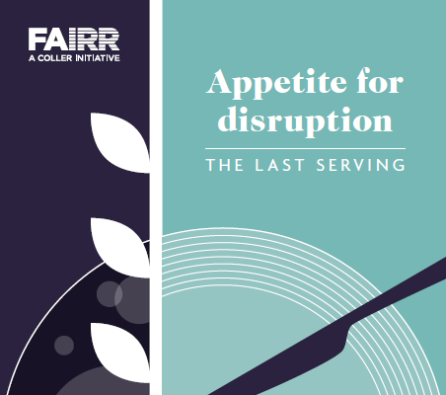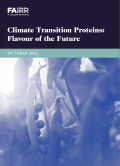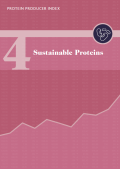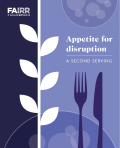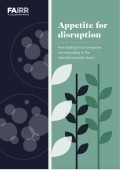Introduction
The pandemic has been a stress test for the animal protein industry, exposing the vulnerabilities of today’s intensive centralised production system. It has brought urgent focus on the need for resilience in the face of growing sustainability challenges in an increasingly resource-constrained world. It has also been a catalyst for accelerating innovation in food technology and driving government-level action – with a focus on healthier, more sustainable diets and long-term food security.
The recent IPCC report is a sobering assessment, predicting a 1.5˚C global temperature increase will be reached by 2040 if global emissions are not halved by 2030 and cut to zero by the middle of this century. The global food system is responsible for nearly a third of all greenhouse gas emissions and threatens the habitat of almost a quarter of all remaining mammal species. Tackling the environmental impact of food production and consumption is, therefore, crucial to limiting warming and protecting global ecosystems.
The current pace of decarbonisation in the global food system is simply not enough. From 2008-2018, food emissions fell at less than half the rate of those from the UK-wide economy, mainly because agricultural emissions have not reduced in the last decade. In the US, food accounts for 10-30% of an average household’s carbon footprint, with animal-derived products (beef, pork, chicken and dairy) contributing nearly 75% of these emissions.
Dietary choices are key determinants of environmental sustainability and human health. Urgent change is needed to ensure more balanced and diversified eating habits, with a greater focus on plant-based foods (fruits, vegetables, grains, legumes, meat analogues, nuts & seeds).
Policymakers are beginning to take note. For example, Denmark’s new dietary guidelines recommend a 30% reduction in meat alongside increased consumption of pulses, legumes and vegetables. Although not yet formally embedded into national guidelines, the UK National Food Strategy also recommends a 30% reduction in meat consumption. In Spain, the consumer affairs’ minister launched a campaign in Summer 2021 encouraging lower meat consumption, while in France, meat has been taken off the school menu in Lyon. And in the US, the Dietary Guidelines Advisory Committee last year recommended a reduction in red and processed meat and an increase in plant-based food consumption.
Protein diversification is now a key component of commercial and climate-mitigation strategies
Shifting from a reliance upon animal-derived protein towards diversified portfolios including plant- and alternative proteins is essential – both to meet shifting consumer and regulatory requirements and to achieve ambitious climate targets.
Over the past five years, the FAIRR Initiative has undertaken extensive engagement with companies and investors on this topic, helping to catalyse this shift.
Today, all 25 companies in FAIRR’s engagement recognise the importance of protein diversification as a material issue for their business. This is in sharp contrast to 2016 when no company was talking about protein, let alone thinking around the commercial and climate-risk mitigation opportunities associated with alternative proteins.
Companies are now looking to build resilience in their protein value chains and portfolios through a dual approach that utilises supply and demand-side interventions. This includes:
Investing in innovation and product development:
Currently, all companies in the engagement are investing in the development of plant-based products – deemed to be one of the fastest-growing categories. 80% of the manufacturers in the engagement have allocated internal capital and/or human resources to support research and development (R&D) in alternative proteins.
Customer-focused initiatives:
53% of retailers in the engagement have formal merchandising strategies in place aimed at normalising plant-based consumption by integrating these products in the meat aisle or giving them dedicated space for increased visibility.
Re-aligning product portfolios:
Companies are committing to transform the composition of portfolios towards lower-impact protein ingredients and products. Seven companies have now set targets to increase the volume and sales of meat and dairy alternatives and/or reduce brand-level emissions.
Improved disclosure:
This year five companies have established formal metrics in this area. Although there is variation in the type of metrics being used to measure exposure to animal-derived and alternative proteins, companies now recognise the need to track and disclose their changing exposure to investors and wider stakeholders.
Sustainable sourcing practices
: These have evolved beyond animal welfare and social impact to address broader environmental impact. Today, all companies in the engagement have some form of sustainable sourcing policy, programme or commitment for at least one type of animal protein in order to address environmental impacts.
Scope 3 emissions targets are increasing:
Companies are increasingly formalising climate ambitions through Scope 3 targets – an important step given Scope 3 emissions account for an average of 92% of total emissions for the companies assessed. Currently, 56% of these companies have Scope 3 targets approved by the Science Based Targets initiative – up from 32% last year.
Companies are also changing their use of language, with increasing use of terms previously considered niche, such as ‘plant-based’ or ‘vegan’. Of the 25 companies in FAIRR’s engagement, 92% referred to these terms in their quarterly and annual reports to investors and other stakeholders.

